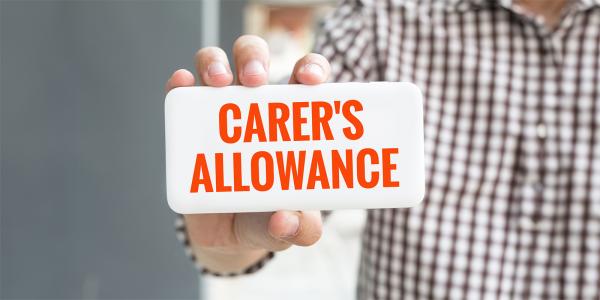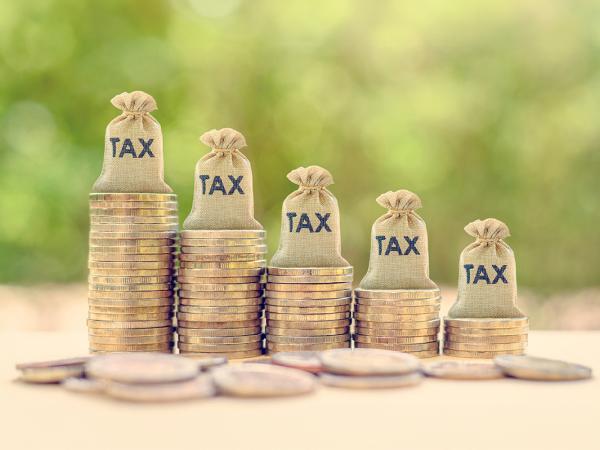Carer's allowance
If you are a full-time carer, you may not be in paid work, due to your caring responsibilities. This does not mean that you do not have to pay tax. If you have taxable income, such as from taxable benefits (including carer's allowance and, in Scotland, the carer's allowance supplement) or investments, and it is more than your tax-free personal allowance, you will have to pay tax.

Content on this page:
Overview
Carer’s allowance is a taxable benefit – but no tax is taken off at the point you receive it.
If you are a carer and you live in Scotland, you may also receive carer’s allowance supplement. This is also taxable, and no tax is taken off at the point you receive it. Carer support payment is starting to replace carer’s allowance with effect from February 2024 in Scotland.
On its own, it is less than the personal allowance (£12,570 for most people in 2024/25, which works out at about £242 per week or £1,048 per month).
However, where your other sources of taxable income in the year (such as from work, investments or a pension for example) plus the carer’s allowance mean that your taxable income exceeds the £12,570 personal allowance, then you will have to pay tax on some of your total taxable income.
The likelihood of having to pay tax in any one tax year if you are a carer increases if you are able to do work alongside your caring duties, or if you start or stop full time work because your caring duties have started or stopped.
The way you pay any tax due depends on what other sources of income you have. If you have a source of income where tax is collected under the PAYE system, like some pensions, then HMRC may ask your pension provider to collect any tax due on your carer’s allowance at the same time. They do this by adjusting your tax code to take account of the benefit. For more information on how tax codes work, see our pages PAYE codes and PAYE coding notices.
HMRC should check the total amount of tax you have paid at the end of the tax year via the P800 process. If it is too much, they should give you a refund. If it is too little, they will usually try and arrange a suitable method of payment with you.
If you do not have a source of income where tax is collected under PAYE – for example if your only other income is from bank interest or dividends, then you may have to complete a tax return under self assessment to pay any tax that you owe.
The earnings threshold
One of the conditions for receiving carer’s allowance is that you must not earn more than £151 a week (in 2024/25). This includes money from employment and self-employment, for example, if you have a part-time job. Money you get from a private or occupational pension, however, is not counted as earnings. If you have other types of income, you should contact the DWP’s carer’s allowance unit to see whether it is taken into account.
The DWP has the discretion to average your earnings over a five-week period, or a ‘recognisable cycle of work’ if you have one.
Weekly earnings
To work out your weekly earnings, you only look at what you have earned after you have paid:
- National Insurance contributions (NIC),
- income tax, and
- half of any money you pay to personal and occupational pension schemes.
You can also take off up to half of the rest of your earnings for amounts you pay to someone from outside your family to look after children, or the person you look after, when you are at work.
You may also be able to take into account some other expenses, such as expenses you have to pay to enable you to do your job.
Our understanding is that such an expense must, as for income tax purposes, be wholly, exclusively and necessarily incurred in the performance of the duties of the employment.
Examples of expenses for which deductions may be made are:
- special tools and clothing,
- professional fees and subscriptions,
- telephone calls made entirely for work purposes,
- business mileage or other work-related travel expenses and any associated subsistence costs, and
- some costs of working from home.
You can find out more about the income tax treatment of employment expenses on our page Employment expenses.
You should contact the DWP carer’s allowance unit to confirm if your expenses are allowable deductions.
If your earnings after deductions vary, you may still be able to claim carer’s allowance for the weeks when they are below the £151 limit.
Should you need it to refer to, you can find the Department for Work and Pensions (DWP) Decision Makers Guidance dealing with the calculation of earnings on GOV.UK (see chapter 15).
Making changes to keep your carer’s allowance
You should consult a welfare rights specialist if you are thinking about making changes to keep your carer’s allowance, especially if you are in receipt of other benefits like tax credits, universal credit or any other means-tested benefits.
You may consider cutting your working hours so that you still qualify. However, depending on your circumstances, cutting your hours to below 16 could mean that you no longer qualify for other things like working tax credit or help with childcare costs like 30 hours free childcare.
Pension contributions
If you are employed and want to make pension contributions, you may be able to join your employer’s pension scheme. All employers must enrol eligible staff into a workplace pension scheme under auto-enrolment. You can find out more about auto-enrolment on our page Pensions: auto-enrolment into workplace pensions.
If you are on weekly pay of less than £192, your employer does not need to automatically put you into a workplace pension scheme. However, you can ask that they do this manually.
If you are self-employed, then you can find information on setting up a pension from MoneyHelper.
As above, we recommend that claimants contact a local advice agency such as Citizens Advice to get help with the best course of action for them due to the way carer’s allowance interacts with other benefits such as tax credits and universal credit.
Making a claim
The main benefit for carers, who spend at least 35 hours a week caring for someone else, is carer’s allowance. In Scotland, you may be entitled to carer’s allowance supplement in addition to carer’s allowance. Note that carer support payment has started to replace carer’s allowance in Scotland. Both carer’s allowance and carer’s allowance supplement are taxable benefits. However, although carer’s allowance counts as income for tax credits and other benefits, carer’s allowance supplement does not.
You can read about the eligibility conditions for carer’s allowance on GOV.UK. You can also find out how to claim. The 2024/25 rate of carer’s allowance is £81.90 a week.
You can read more about the eligibility conditions for carer’s allowance supplement on mygov.scot.
You can read more about carer support payment on mygov.scot.
Some people may qualify for carer’s allowance but may not receive it. This is because it is classed as an income-replacement benefit and you cannot normally get two income-replacement benefits paid together, for example carer’s allowance and the state pension. If you qualify but cannot get carer’s allowance because of this rule, you have an ‘underlying entitlement’ to carer’s allowance instead.
Certain benefits, such as universal credit and pension credit, have carer elements or premiums. These are paid as additional elements if you have caring responsibilities and meet certain conditions. If you receive carer’s allowance, this will usually be treated as income when calculating other benefits.
If you are a carer, you should seek specialist welfare rights advice to understand whether you can/should claim carer’s allowance, carer elements in other benefits or potentially both.
If the person you are caring for receives certain benefits, the amount they receive may be affected if you claim carer’s allowance or the carer elements of other benefits. It is important that both you and the person you care for understand the potential consequences of your claim for carer’s allowance.
This page refers to the rules that apply in England, Wales and Scotland. There is an equivalent benefit to carer’s allowance in Northern Ireland, with similar rules and claim form. You can find more information from nidirect.
Starting a new job
If you are about to start a new job after having received carer’s allowance, but do not have a P45 from a previous employment to give to your new employer, you need to help your new employer understand what tax code to use by completing a starter checklist.
You are asked which statement applies:
- This is your first job since last 6 April and you have not been receiving taxable jobseeker's allowance, employment and support allowance, taxable incapacity benefit, state pension or occupational pension. (Box A)
- This is your only job, but since last 6 April you have had another job, or have received taxable jobseeker's allowance, employment and support allowance or taxable incapacity benefit. You do not receive state or occupational pension. (Box B)
- You have another job or receive a state, works or private pension. (Box C)
As stated above, carers allowance is a taxable benefit – but it is not specifically mentioned alongside the other taxable benefits listed in the starter checklist. It is important to understand that ticking box A can lead to you being given the benefit of the full tax-free personal allowance to set against your employment earnings, which may mean that you have an underpayment in respect of the carer’s allowance at the end of the tax year. If you are unsure which box to tick, you should contact HMRC for advice.
Carer’s credit
Carer’s credit is a National Insurance credit for carers under state pension age. There is more information on our page NI credits for carers.
More information
England, Wales and Scotland
There is detailed information in the claim notes for carer’s allowance on GOV.UK.
You can also contact the Carer’s Allowance Unit.
For information about carer’s allowance supplement, visit the Scottish Government website.
For more information about carer support payment, visit the Scottish Government website.
Northern Ireland
This page refers to the rules that apply in England, Wales and Scotland. There is an equivalent benefit in Northern Ireland, with similar rules and claim form. You can find more information from nidirect.
Carers UK
Carers UK is a charity that helps various types of carers. They provide information, advice and support for carers. You can visit their website for more information, including details of their telephone advice line. They also provide details of local contacts to support carers.



